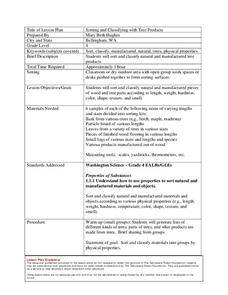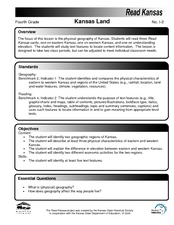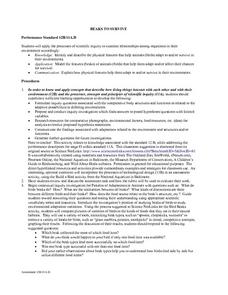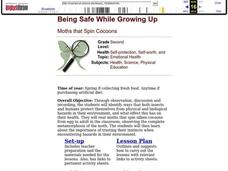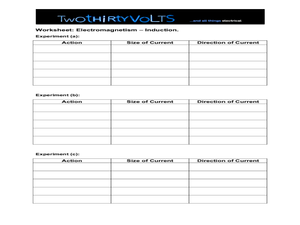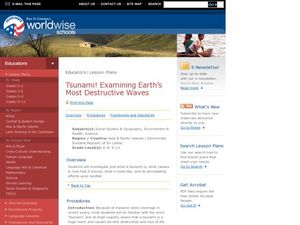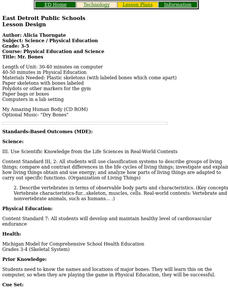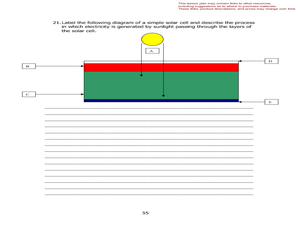Curated OER
Sorting and Classifying with Tree Products
Fourth graders sort and classify wood. In this sorting tree products lesson, 4th graders sort and classify tree parts and pieces of wood, both natural and manufactured according to their properties.
Curated OER
Chemical Changes
Eighth graders observe two types of interactions in a sealed plastic bag. One bag contains baking soda and water, and the other baking soda and vinegar. They determine what evidence indicates that a chemical change is occurring.
Curated OER
Kansas Land
Fourth graders discover the geographic regions of Kansas. In this geography instructional activity, 4th graders explore the different regions of Kansas and determine how the different geography affects daily life in Kansas.
Curated OER
Naked to the Eye
Sixth graders study microorganisms. In this microorganism lesson, 6th graders explore the form and function of these organisms. Students use magnification during experiments on bread.
Curated OER
How Do Foods Help Our Bodies
Students investigate the specific elements found in food that keep us healthy. In this healthy eating lesson, students identify proteins, carbohydrates, minerals, and vitamins as part of a healthy diet when consumed in moderation....
Curated OER
How Things Fly
Students, by drawing on their own experiences, discuss and examine the basic physics of flight. They participate in a variety of activities regarding flight.
Curated OER
More about Arteries, Veins and Capillaries
Learners list and describe the purpose/function of blood vessels (arteries, veins and capillaries). They explain how blood flows through the body, and the role of physical activity and how it strengthens the heart.
Curated OER
Beaks To Survive
Students discuss and identify the types of adaptations that are made by different organisms in order for them to survive. In groups, they describe the features of beaks and discuss how it affects their chances for survival. They share...
Curated OER
Forest Management
Young scholars analyze physical and biological changes in the Sequoia forest ecosystem, especially logging and fire management practices. They evaluate the controversy of how logging and fire management should be conducted in the Giant...
Curated OER
Critter Characteristics
Students explore the adaptations of deep sea life forms. In this science lesson, students watch a video to observe characteristics which allow for the sea creature to thrive in it's environment. Students determine the physical,...
Curated OER
Being Safe While Growing Up
Second graders identify ways that both insects and humans protect themselves from physical and biological hazards in their environment. They rear moths from egg to adult and consider the importance of trusting their own instincts.
Curated OER
Microscopes and Crystals
Students observe crystals under the microscope. In this science lesson, students compare how the crystal look like using their eyes, hand lens and microscope. They identify the type of crystal based on the amount of light they allow to...
Curated OER
Wh0-o-o-o's Out There?
Fifth graders describe the physical features of an owl and identify survival adaptations. They Investigate an owl's niche in an ecosystem. The students participate in an interactive puzzle on the internet that helps for motivation.
Curated OER
Home Electrical Safety
Students explain the danger of incorrectly wired plugs. In this physics lesson, students construct their own safe plug. They share the finished project in class.
Curated OER
Electromagnetism - Electromagnetic Induction
Students investigate electromagnetic induction. In this physics lesson, students construct Faraday's coil to observe what happens when a wire moves through a changing electromagnetic field. They complete lab report and present results to...
Curated OER
Electricity – Ohm’s Law
Students investigate the relationship between voltage and current. In this physics lesson, students observe and collect data from the experiment. They graph the result and share them to class.
Curated OER
Catch Me if You Can
Third graders investigate behavioral and physical adaptations, such as camouflage, that allow animals to respond to life needs.
Curated OER
Tsunami! Examining Earth's Most Destructive Waves.
Students discover what creates a tsunami In this earth science lesson plan, student research using the Internet how tsunami's develop. Students read accounts of first responders to the Sri Lanka tsunami.
Curated OER
Variations
Sttudents examine populations of living things and identify variations in physical features.
Curated OER
Mr. Bones
Young scholars play CD-ROM game My Amazing Human Body, and participate in relay game in Phys. Ed. where they put together skeleton on which body parts are labeled.
Curated OER
Photovoltaics and Solar Energy
Students experiment with photovoltaic cells and determine the energy use of their appliances. In this renewable energy lesson plan, students calculate the energy emitted by a photovoltaic cell through an inquiry-based lab. They keep...
Curated OER
Electromagnetic Spectrum
Students define electromagnetic radiation, list major categories and uses of electromagnetic waves, identify potential health risks with electromagnetic waves, and demonstrate understanding of Plank's constant by solving quantitative...
Curated OER
The Wonderful World of Waves (Wave Basics)
High schoolers define amplitude, wavelength, frequency, and period, calculate period given frequency, and calculate frequency given period, define crest and trough and locate both on diagram of wave, differentiate between latitudinal and...
Curated OER
What State Are You?
Students identify three states of matter and recognize plasma as fourth state. They provide examples of matter that are classified in particular state and identify properties of each state of matter.


